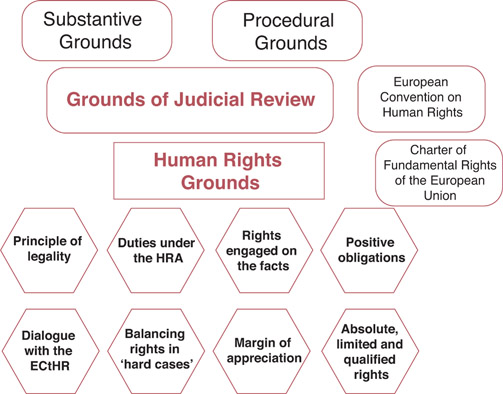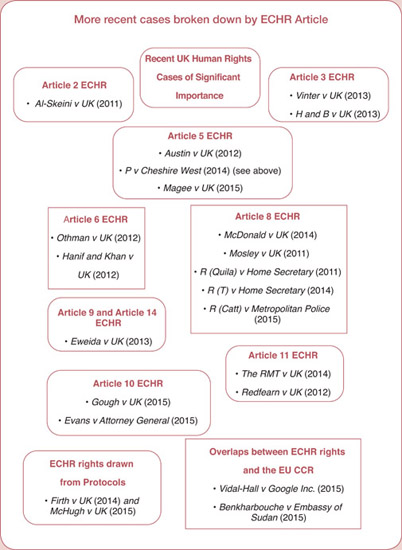France Judges Can Review and Challenge Laws Human Rights
Human being RIGHTS GROUNDS FOR JUDICIAL REVIEW
16
Human rights grounds for judicial review

16.1 An overview of human being rights grounds for judicial review
16.one.1 This chapter has a slightly different structure and style to Chapters 1–fifteen:
- • It begins with the employ of ten key cases to explore the workings of human rights-based judicial review.
- • It should be read in conjunction with Chapter 7 (addressing the performance of the European Convention on Human being Rights in the United kingdom of great britain and northern ireland, through the Man Rights Act 1998); along with Chapter 13 – which discusses problems of process, continuing and remedies in judicial review cases.
- • The subsequently parts of this chapter focus on and explain how certain man rights-based arguments were used in recent cases involving Britain public bodies or the Uk Regime – cleaved down by different Articles of the ECHR.
Key human rights principles: Instance one
R five Secretarial assistant of Country for the Domicile Section, ex parte Simms [2000] 2 Air-conditioning 115
sixteen.1.2 This instance features the best exposition of the principle of legality, in the era of human rights law, which has withal been written. In the words of Lord Hoffmann (at 131):
'Parliamentary sovereignty means that Parliament tin can, if it chooses, legislate opposite to fundamental principles of human rights. The Human Rights Act 1998 will not detract from this power. The constraints upon its practise by Parliament are ultimately political, not legal. But the principle of legality means that Parliament must squarely confront what it is doing and accept the political cost. Fundamental rights cannot exist overridden by general or ambiguous words. This is considering in that location is too neat a hazard that the full implications of their unqualified meaning may have passed unnoticed in the democratic process.'
Key homo rights principles: Case 2
YL v Birmingham City Council [2007] UKHL 27
16.1.three The case which all the same determines the examination as to whether duties under man rights law utilize (or non) to a private body conveying out a public office – for example, the departure between arranging personal intendance under a statutory duty (and so human rights duties exist) or carrying out that care under a contract (where man rights duties were plant not to exist).
16.one.4 The outcome of the case (in the Firm of Lords finding there were no human rights duties owed by a privately run care dwelling house as a care provider) caused plenty political backlash to see the creation of department 145 of the Health and Social Care Act 2008 to redress the situation, at to the lowest degree in terms of residential social care.
Key man rights principles: Example 4
In re W (Children) (Family Proceedings: Evidence) [2010] UKSC 12
xvi.1.vii In notoriously 'hard' cases, human being rights law in the United kingdom of great britain and northern ireland can be all about balancing the rights of two parties or sides to a dispute, or a criminal case. In W (Children), the right to a fair trial of a defendant was relied upon in the 'rebalancing' of that correct as against the right to respect for private life of a child complainant in a prosecution for serious sexual offences. Prior to this decision, there had been a presumption that an alleged child victim of a sexual offence would not be cross-examined by defence force counsel, merely would merely give a statement that would be read to the court in their absence. This presumption was successfully challenged in this case by counsel for a defendant charged with rape of his ain stepdaughter.
16.1.8 This ensured that each subsequent application for the prosecution to introduce a argument alone, rather than have such a child complainant cantankerous-examined on the basis of that statement, would demand to exist examined in the calorie-free of the particular facts of the relevant case. This procedural victory of sorts for the correct to a fair trial is a morally uneasy one for some, but as Lady Unhurt reminded u.s. in her judgment in the example: 'A fair trial is a trial which is fair in the light of the bug which have to be decided.'
xvi.2 Engaging rights: measuring lawful and unlawful interferences with rights
Key human being rights principles: Case 5
P v Cheshire W and Chester Council [2014] UKSC 19
16.2.1 When considering human rights-based grounds for judicial review, first we must be confident that a right protected by the ECHR is 'engaged'. That is to say, that a correct is existence negatively afflicted by the actions or decision of a public body. Tests and analyses of whether a correct has been 'unlawfully interfered with', or violated, to use the term deployed past the European Courtroom of Human Rights, come up as the side by side stage, once information technology is established that a Convention right has been engaged by a public body.
16.2.two In Cheshire W, Lady Unhurt reminds us that 'a golden cage is however a muzzle'. P, the claimant, who is severely disabled, was placed under a care plan past Chester Council staff which meant that his ability to leave his place of residence, a care abode known as Z House, was restricted – and he was sometimes restrained while beingness fed. In this bright judgment, which reminds us of how to measure out whether human rights of individuals are 'engaged', we see that we must measure a homo rights infringement, washed in a person's all-time interests and in proficient faith, in the same style as with malice or through neglect: hence the phrase, 'a aureate cage is still a cage'.
16.ii.3 So a right under the ECHR is even so 'engaged' if it is interfered with even for a benevolent purpose.
16.4 The concept of 'positive obligations' under the ECHR
Key human rights principles: Instance 7
Rabone v Pennine Intendance NHS Trust [2012] UKSC 2
sixteen.4.1 In this case, there was an institutional declining to do plenty to prevent the suicide of a person nether the care of the National Wellness Service. Rabone shows us that it is non just the deportment of a body with human rights duties that tin can borrow a person's rights under the ECHR, but likewise failures to act, or the disorganisation of such a body and its work which leads to dangerous failures.
16.4.2 As such, Rabone is a case that clearly demonstrates the scope of 'positive obligations' placed on public bodies to uphold the rights of individuals nether the ECHR.
xvi.5 The concept of a margin of appreciation
Key human rights principles: Case 8
S.A.S. v France Awarding No. 43835/11 (1 July 2014)
xvi.5.1 When Governments interfere with a qualified correct under the ECHR, through the cosmos of a criminal offence in their domestic police, they may practice so with greater breadth using their 'margin of appreciation' – meaning that the legal and constitutional culture and conventions of that jurisdiction may brand for greater possible restrictions on the telescopic of some rights than in other jurisdictions across the Council of Europe.
16.5.2 In this instance, the so-called 'burqa ban' was upheld by the Strasbourg Court as being inside the French Government's 'margin of appreciation', largely due to the French secular constitutional value of 'laïcité'.
16.vi Preventing the use of ECHR rights to undermine the rights of others
Key Human being Rights Principles: Case 10
Norwood v U.k. [2005] forty EHRR SE11 (Application No. 23131/03)
16.half dozen.1 Norwood had displayed an offensively anti-Islamic poster in the window of his property, and was duly convicted of a public society offence. He tried to challenge his conviction earlier the European Court of Human being Rights on the basis that the relevant criminal conviction unlawfully restricted his freedom of expression – but his claim was accounted inadmissible and it therefore failed.
sixteen.6.ii The Strasbourg Court (and the ECHR) cannot tolerate the purported utilize of a qualified right (freedom of expression) to undermine the rights, safety and well-beingness of others in guild.
xvi.vi.iii The principle that legal arguments based on human rights in the ECHR cannot be used to undermine the rights of others is laid downwards in Article 17 ECHR.
Fundamental Cases Checklist

sixteen.7 Commodity 2 ECHR
16.7.1 Article 2 ECHR provides individuals with the right to life, which also entails a positive obligation for deaths to be investigated by the Member State which should have safeguarded the lives of individuals that are killed.
xvi.viii Article 3 ECHR
16.viii.1 Commodity 3 ECHR protects individuals from torture, as well as inhuman or degrading treatment. This protection must be extended to even the most reviled or hateful criminal offenders in a lodge; or every bit Sir Tom Bingham in one case noted, those subject to the greatest 'public obloquy', or stigmatisation. It must besides be a right extended and used to protect the most vulnerable in society, such as failed asylum seekers unable to return safely to their land of origin.
16.9 Article v ECHR
16.9.1 Article 5 ECHR protects the right to liberty and security of the person – and is 'engaged' or affected, in many unlike sorts of contexts where an individual is bodily or spatially controlled or restrained. In P v Cheshire West (2014), discussed in this affiliate, above, the Uk Supreme Court drew on a bang-up deal of instance law from the European Courtroom of Man Rights to determine that the first issue in examining whether there had been an infringement of Article 5 ECHR is to found the degree to which a person's freedom was actually limited or restricted, fifty-fifty if this was done in their best interests, in the context concerned.
sixteen.9.2 Austin 5 UK (2012) 55 EHRR xiv (ECtHR)
 Key Facts
Key Facts
Thousands of demonstrators had been detained within box-shaped police force cordons on the streets of London (a police tactic often called 'kettling'), after some of the demonstrators had become more tearing and disorderly in their behaviour. Austin had been one of the demonstrators that were 'kettled' for more than 5 (and upwardly to seven) hours in cold, open up streets with no shelter, water or food provided, while the police dispersed the crowd gradually through an opening in one part of their cordon. Austin claimed that the law tactics had been a breach of her Article 5 ECHR rights. The European Court of Human Rights dismissed her claim.
Only gold members tin continue reading. Log In or Register to proceed
Source: https://lawexplores.com/human-rights-grounds-for-judicial-review/
0 Response to "France Judges Can Review and Challenge Laws Human Rights"
Post a Comment